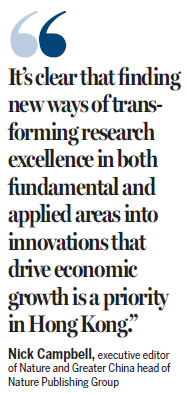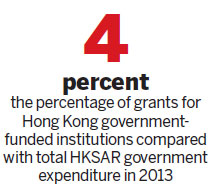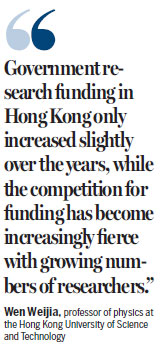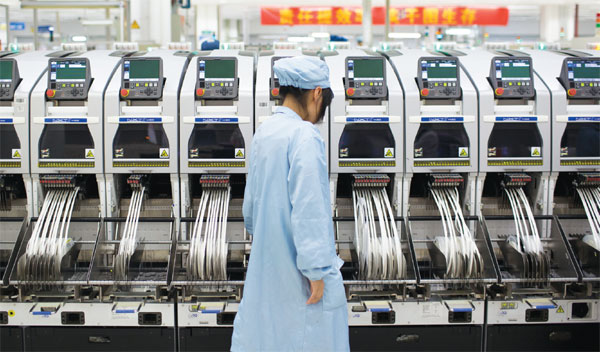SAR shines at science awards
Updated: 2015-01-13 06:01
By Cheng Yingqi(HK Edition)
|
|||||||
|
Experts are calling for prompt action to strengthen Hong Kong's competitiveness in the financial and service industries as well as in the sci-tech field as securing funding becomes difficult. Brent Lewin / Bloomberg |
Eight HK projects win top honors for contributions to scientific researc
Researchers from Hong Kong are blazing a trail despite a funding crunch, but stronger ties between the SAR and the Chinese mainland may be the answer for profitable research and development.

Eight scientific research projects either led or aided by Hong Kong scholars were among winners of the nation's top science awards, as experts said stronger Hong Kong-mainland ties would be mutually beneficial in the face of increasing competition from mainland cities.
The awards were presented by President Xi Jinping, Premier Li Keqiang and other State leaders in a ceremony held at the Great Hall of the People in downtown Beijing on last Friday morning.
Two projects led by Hong Kong professors and three joined by researchers from the SAR received second-class honors in the State Natural Sciences Awards, which recognize major breakthroughs in fundamental research.
Three other projects, in which Hong Kong researchers had a role, received the State Science and Technology Progress Award in honor of their contributions to economic benefits.

The prizes come from the National Office for Science and Technology Awards under the ministry for the sector.
"I was able to spend decades completing the award-winning project only because I have diversified funding channels. Most researchers in Hong Kong, however, are not as lucky as I am," said Wen Weijia, professor of physics at the Hong Kong University of Science and Technology (HKUST), whose team took second place in the State Natural Sciences Awards.
"Since Hong Kong has relocated most of its manufacturing business to the mainland, the development space for transfer of R&D (research and development) achievements is rather limited, and the resources put into scientific research in Hong Kong are inadequate," he added.
University Grants Committee statistics show that grants for Hong Kong government-funded institutions increased from HK$11.5 billion ($1.5 billion) in 2003-04 to HK$15.5 billion in 2013-14, but the percentage in terms of total HKSAR government expenditure fell from 6 percent to 4 percent in that decade.
"Government research funding in Hong Kong only increased slightly over the years, while the competition for funding has become increasingly fierce with growing numbers of researchers," Wen said.
As competition for funding grows more intense, more and more Hong Kong researchers are turning to the mainland, where innovative enterprises are emerging as a result of heavy government investment.
In 2013, R&D spending on the mainland was as much as 1.2 trillion yuan ($193.2 billion), with 618.5 billion yuan of that coming from the State budget, according to statistics released by the Ministry of Science and Technology.
Since 2011, more than 240 Hong Kong scholars have participated in some of the largest mainland-funded scientific research projects, receiving funds totaling 138 million yuan and bringing in an ever-increasing number of scientific awards involving researchers from the SAR.
In late November, a report in Nature, a prominent interdisciplinary scientific journal, showed that Hong Kong ranked fourth behind Beijing, Shanghai and Nanjing in terms of the city's average contribution to scientific research papers published in top-class international journals. After 17 years of prosperity and academic freedom since the transfer of sovereignty from the UK to Beijing, Hong Kong needs to rethink its long-term strategy amid the political unrest and increasing competition from mainland cities, the report said.

"Hong Kong has competitive strength in its financial and service industries, but not in the sci-tech field. With the rise of major cities in the mainland such as Beijing, Shanghai, Shenzhen, and so on, even its strength in the financial and service industries will gradually fade out if prompt action is not taken," said Shi Ling, associate professor of Electronic and Computer Engineering at HKUST. "The funding situation has worsened in the past few years. Although major initiatives get much more funding than before, most individuals find that it is becoming increasingly difficult to obtain small-scale funding. The amount of funding awarded is also smaller, compared with similar types of funding programs on the mainland," he said.
For example, a typical individual project sponsored by the Hong Kong Research Grants Council ranges from HK$500,000 to HK$800,000, while a typical small individual project sponsored by the National Natural Science Foundation of China would get 800,000 yuan on average.
"Hong Kong only has a few universities and most of their faculty members have exceedingly good research track records. Following the US model and limiting the success rate of funding applications does not make much sense. If a wider range of faculties can be supported, more exciting research outcomes can be expected," Shi said.

To give the city an edge, the Hong Kong Legislative Council on Oct 29 last year passed a resolution to set up the Innovation and Technology Bureau with the aim of supporting startup companies and providing financial assistance for universities and research institutions to commercialize their findings.
"Hong Kong has a long and proud history of producing high quality research and, in many ways, has led the way for mainland cities that are rapidly increasing the volume of their high quality research output," Nick Campbell, executive editor of Nature and Greater China head of Nature Publishing Group, told China Daily in an email. "However, like all cities that aspire to compete at a global level, it faces the challenge of an increasingly wide range of similar aspirants from all over the world," he said.
Meanwhile, Campbell believes it is not a "zero-sum game" for Hong Kong because proximity to and strong ties with mainland research institutions actually see the city well-placed for collaborative endeavors that are ultimately likely to benefit partners on either side of the border.
"It's clear that finding new ways of transforming research excellence in both fundamental and applied areas into innovations that drive economic growth is a priority in Hong Kong, just as it is on the mainland and for an increasing number of governments around the world," he said.
chengyingqi@chinadaily.com.cn
(HK Edition 01/13/2015 page9)
